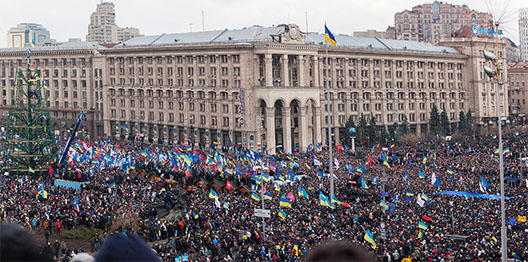
KYIV — For twenty-six days Ukrainians have stood in protest demanding that their president, Viktor Yanukovych, reject the blandishments of autocratic Russia. Instead, they insist that he sign a free trade agreement with – and embrace the democratic standards of – the European Union.
The crowds in Kyiv’s Maidan Nezalezhnosti (Independence Square) have ebbed and surged from thousands to as many as half a million, defying bracing winter temperatures to stand up for their country’s European future.
With a population of 45 million on the border of the European Union, Ukraine’s sovereignty and its ability to withstand Moscow’s pressures to amalgamate into its military-political space is crucial to ensuring that an authoritarian Russia never reemerges as a world power. The stakes in Kyiv are therefore crucial to securing the future of a peaceful democratic Europe.
This protest is driven not by personalities, but by ideas. It demands the rule of law and accountability, and opposes corruption and police violence and intimidation. Remarkably, the protest movement has maintained nonviolent discipline and eschewed radicalism even in the face of brutal attacks by police.
As the excellent Ukrainian journalist Katya Gorchinskaya has written, this protest movement also represents the emergence of a real sense of Ukrainian national identity: “This is about a nation being born. Mutilated by years of misrule, impoverished by looting, it emerges slowly from the ruin. This process is massive and we don’t know how well this birth is going to go. But it’s happening now and here, in Kyiv, and it’s both painful and awesome. The only place to truly feel the pain and grandeur of this national awakening is to stand there right on Maidan.”
The protest movement has wrought some important changes. Through its civic fervor, it has reopened the door to Ukraine’s association agreement with the EU, after President Yanukovych had closed it. It has sent a shot across the bow of Russian President Vladimir Putin as he presses, and entices, Ukraine’s leaders into joining the Russia-dominated Eurasian customs union and Moscow’s sphere of influence. It has shaken the security of President Yanukovych’s rule and opened the possibility of a return to checks and balances in place of Ukraine’s super-presidential, semi-authoritarian system. It has reminded us how dynamic is Ukraine’s civic life and how diverse and free are its media, which are reporting the ongoing events with no less objectivity than can be found in the US and European press.
Moreover, the Maidan protests have contributed to the emergence of a sophisticated political opposition and perhaps an even more impressive civic leadership. Far from demanding the overthrow of the state, the protesters seek:
- a return to the constitutional order of 2004, in which a more balanced parliamentary-presidential system prevailed;
- the resignation of the current, discredited government;
- the creation of a consensual, “non-political,” short-term government to implement a program of economic reforms that would help Ukraine stabilize its out-of-control budget and its increasingly fragile hard currency reserve back on track;
- the signing an EU association agreement;
- restoration of a stand-by agreement for $15 billion in credits with the IMF, which was suspended in 2011;
- prosecution and punishment of high-ranking officials guilty of ordering violent attacks on innocent protestors and journalists;
- the release of Ukraine’s handful of political prisoners; and
- new legislative elections under strict international monitoring.
While a violent outcome or a winter-induced attrition of support for the protest remain possible, so too does the prospect that the campaign may attain its ambitious aims.
Reasons for hope: Ukraine’s opposition is seeking an evolutionary path out. And the country’s business elite (its oligarchs), as well as a handful of reform oriented moderates in the government camps, are interested in compromise, as a recent statement from one of Yanukovych’s principal backers, Ukraine’s richest man, Rinat Akhmetov, makes clear.
In coming days, we will watch as Ukraine decides how its crowds will ultimately end their occupation of Kyiv’s iconic public square. That event will contain a tipping point between a corrupt dictatorship that could arise from the brutal suppression or the ebbing of the national will – or a national consensus and a democratic, European future that could emerge from an intelligent compromise.

